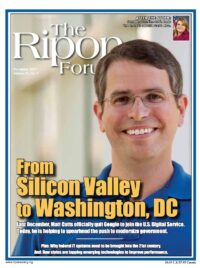
This year has offered America a front row seat to understand just why the National Flood Insurance Program is so vital.
We’ve all watched the powerful and devastating floods impact our communities in the aftermath of hurricanes Harvey, Irma, and Maria over just a few months. The exact cost to repair the damage is still unknown. However, the emotional damage inflicted on communities is immeasurable – lives lost, families displaced, and local economies left underwater.
Unfortunately, Americans rebuilding after these devastating natural disasters often find their hardship compounded by a National Flood Insurance Program (NFIP) that overcharges and under-delivers for policyholders and taxpayers. More than five million Americans depend on the NFIP to protect their homes and businesses. From Colorado to New Jersey to South Carolina to the Gulf, the NFIP is no longer just a program for hurricane-prone areas. It is a program for the entire U.S.
That’s why I helped introduce the bipartisan Sustainable, Affordable, Fair, and Efficient (SAFE) National Flood Insurance Program Reauthorization Act of 2017 with five of my colleagues. The system right now is backwards. Under the current structure, FEMA spent more than $277 billion in disaster aid to rebuild communities after floods from 2005 to 2014. Only a fraction of that went towards efforts to stop or control floodwaters to avert future disasters. Rebuilding communities after a disaster is far more expensive than working proactively to reduce or prevent their devastation in the first place.
Americans rebuilding after devastating natural disasters often find their hardship compounded by a National Flood Insurance Program that overcharges and under-delivers for policyholders and taxpayers.
Our legislation prioritizes prevention on the front end to address these very issues. It would also provide long-term certainty for all stakeholders by reauthorizing the program for a reasonable period of six years. In addition, it would reduce the current annual premium increase caps to 10 percent, providing financial relief for families, who currently face 18 percent increases, and businesses, which currently face 25 percent increases each year.
Avoiding unaffordable rate hikes is a crucial component if one wants to shield real estate markets from depressed property values. Local markets won’t be thrown into chaos with this bill, and families and small businesses can still afford to pay their premiums.
SAFE authorizes funding for extensive high-tech mapping, also known as LiDAR, and allows for the future use of state-of-the-art technology to better and more accurately identify flood risk. This is an especially important component, because NFIP should help prevent flooding in the first place, not just help clean up afterwards.
It also includes language from another bill I authored – called The NFIP Consultant Accountability Act — which would give the FEMA Administrator the authority to fire consultants and contractors who engage in conduct detrimental to the mission of the NFIP. This is a simple common-sense reform that, frankly, should have been in place years ago to protect homeowners from bad actors.
Our bipartisan legislation streamlines the claims process and makes considerable improvements to the customer experience. American families deserve a smiling face and helping hand after a disaster, not some Washington bureaucrat who hands them a stack of paperwork.
SAFE also cuts wasteful program expenses to pay for investments in mitigation. By temporarily freezing interest payments on the program’s debt, FEMA can now direct $400 million annually to invest in proactive mitigation like providing low-interest loans for homeowners to elevate their homes and for communities to fund critical flood protection projects.
From Colorado to New Jersey to South Carolina to the Gulf, the NFIP is no longer just a program for hurricane-prone areas. It is a program for the entire U.S.
Most people do not realize that the NFIP has paid the federal government $4 billion in interest over the last decade. These payments mean homeowners and businesses are spending more than 10 percent of all of their premiums on interest to the federal government. If invested correctly, we could save at least $4 for every dollar spent.
The bill would generate additional savings by eliminating waste in FEMA’s Write Your Own program, where private insurers selling NFIP policies pocket at least 31 cents of every premium dollar while bearing little to no financial risk. Even with those savings, insurance agents who sell these policies would maintain their current commission rate and suffer no unintended consequences from this SAFE.
Finally, under the SAFE NFIP Act, we would expand coverage limits to $500,000 for residences and $1.5 million for multi-family and business structures. The limits have not changed for decades, and a common sense increase is long overdue.
Going forward, Congress must do a better job urging regulators to ensure those who are required to participate actually purchase coverage. Costs will continue to be high if mandated participation is low, and there are no two ways around that fact.
I want to encourage my colleagues not to play politics with this program, because families and livelihoods all across this country depend on it, literally. I believe we have a bill that makes sense for the policyholders and the stakeholders, and I hope my Senate colleagues will give it their full consideration.
John Kennedy represents the State of Louisiana in the United States Senate.




